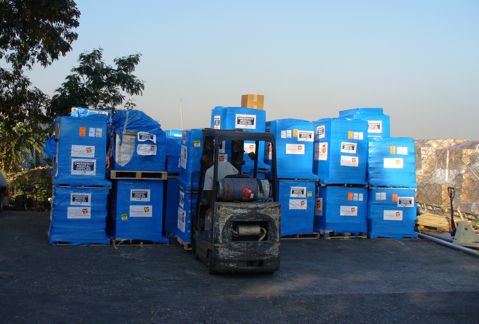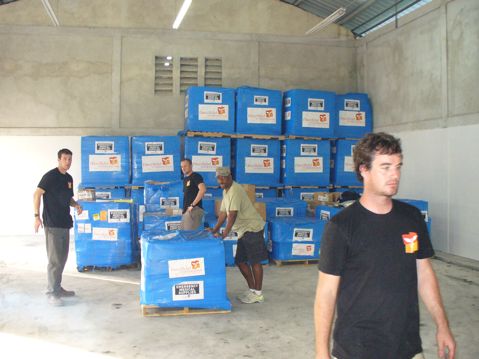Welcome Arrival
60 Pallets of Medical Supplies Make It to Haiti, Soon to Be Distributed
As former President Bill Clinton arrived in Port-au-Prince, Haiti, on Friday for his second trip to the island since the January 12 earthquake, 60 pallets shrink-wrapped in blue — delivered just hours earlier by a FedEx flight — sat 150 yards away from him. It was a spectacular sight indeed, with the pallets — some weighing in excess of a ton — stacked high atop one another. On the outside, big Direct Relief International stickers signaled where the much-needed aid came from, and on the inside, emergency medical supplies sat waiting to be distributed to the people of Port-au-Prince and throughout the devastated island.

This particular morning on the airport tarmac, DRI’s director of emergency preparedness and response, Brett Williams, was practically jumping up and down with excitement. He exchanged high fives with his two team members, Andrew MacCalla and Gordon Willcock, as DRI’s latest shipment was stacked near aid supplies from around the world. But at that location, there were few other sights amongst the other relief material more impressive than the high rows of blue DRI pallets.
Later in the day, delayed by customs (back up and running for the first time since the earthquake) and Clinton’s arrival (which all but shut down activity at the airport for a couple hours), the cargo made its way to DRI’s newly rented warehouse, located down a road 15 to 20 minutes from the airport.

The warehouse, rented from the owner of one of Haiti’s largest water and ice companies, appears to be just what DRI needs with regard to space, price, and location. After negotiating the price, the two sides settled on $4,000 a month, which, in addition to use of the 34-by-54 foot space, includes drivers and trucks, pallet lifts and forks, and security. The owner, not intending on playing hardball, told the trio upfront, “You guys are coming in to help my country, so we can make it work.”
Indeed he made it work and, despite his obvious wealth, the owner drove the forklift himself, unloading the boxes off his two trucks which were used to transport the shipment. The group, tired and weary from a long week of planning and the heat, is gearing up to distribute as much of the $16 million of medicine and supplies as it can. The team may already have positive responses from a few hospitals and clinics. The majority of the shipment is medication for people with diarrhea, caused by poor drinking water.



